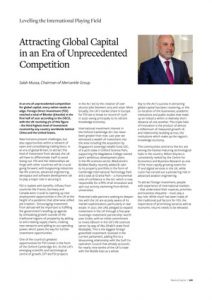Attracting Global Capital in an Era of Unprecedented Competition

March 30, 2022
Levelling the International Playing Field
Salah Mussa, Chairman of Mercantile Group.
In an era of unprecedented competition for global capital, every nation needs an edge. Foreign Direct Investment (FDI) reached a total of $870bn (£620bn) in the first half of 2021 according to the OECD, with the UK receiving 5% of this figure - the third highest level of investment received by any country worldwide behind China and the United States.
New horizons present challenges, but also opportunities within a network of open and consolidating trading blocs. In an era of global Britain, to attract this kind of investment from abroad, the UK will have to differentiate itself to avoid losing out. FDI and the relationships we forge with other countries will be crucial going forward, with burgeoning industries like life sciences, advanced engineering, aerospace and software development set to play a major role in securing it.
FDI is replete with benefits. Inflows from countries like France, Germany and Canada were crucial to opening up new employment opportunities in the UK at the height of a pandemic that otherwise stifled job creation. Encouraging investment from abroad will be important to fulfilling the government’s levelling up agenda by stimulating growth outside of the traditional regions of prosperity by adding to and creating supply chains, creating new networks and adding to our spending power, which paves the way for further investment opportunities.
One of the country’s greatest opportunities for FDI comes in the form of the Oxford-Cambridge Arc. As the UK’s emerging scientific and technological centre of growth, DIT-led FDI projects in the Arc led to the creation of over 26,000 jobs between 2015 and 2020. More broadly, the UK’s market share in Europe for FDI set to break its record of 17.5% in 2020 owing principally to its vibrant knowledge economy.
International investment interest in the Oxford-Cambridge Arc has never been greater than now. Last year we witnessed a wealth of investment into the area including the acquisition by Singapore’s sovereign wealth fund, GIC, of a 40% stake in Oxford Science Park, supporting the Magdalene College-owned park’s ambitious development plans. In the life sciences sector, Blackstone’s BioMed Realty recently added $1.12bn to its property portfolio in the form of Cambridge International Technology Park and a seat at Granta Park – a monumental vote of confidence in the Arc which is now responsible for a fifth of all innovation and spin-out activity stemming from British universities.
Potential trade partners seeking to deepen ties with the UK are acutely aware of its market sophistication, particularly in real estate. In 2021, the UAE pledged to expand investment in the UK through a five-year ‘sovereign investment partnership’ worth over £10bn, with an initial commitment to invest £800m in the UK’s life sciences sector by way of Abu Dhabi’s state fund Mubadala. This is the biggest foreign greenfield investment received in the current parliament, adding fire to a blossoming relationship with the Gulf Co- operation Council that already accounts for nearly nine-tenths of the UK’s trade with the Middle East as a whole.
Key to the Arc’s success in attracting global capital has been clustering, or the co-location of the businesses, academic institutions and public bodies that make up an industry within a relatively short distance of one another. This triple helix of innovation is the product of almost a millennium of measured growth of, and relationship-building across, the institutions which make up the region’s knowledge economy.
The communities central to the Arc are among the fastest-maturing technological hubs in the country. Milton Keynes is consistently ranked by the Centre for Economics and Business Research as one of the most rapidly growing towns for IT and digital services in the UK, while Luton has carved out a pioneering role in advanced aviation engineering.
To attract foreign investment, people with experience of international markets – that understand their nuances, priorities and business etiquette – must play a key role. While much has been made of the traditional pull factors for FDI, the importance of prioritising social as well as economic returns needs to be elevated.





